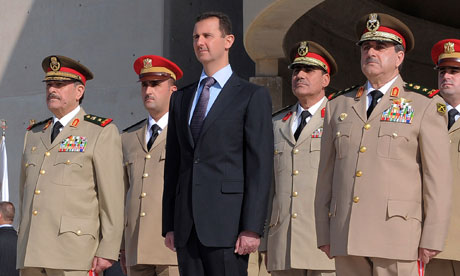- Washington “follows with interest” Morocco’s openness onto Africa (John Kerry)Posted 11 years ago
- The trial of South African Paralympic champion Oscar Pistorius opened in Pretoria on Monday.Posted 11 years ago
- USA welcomes efforts of King Mohammed VI in MaliPosted 11 years ago
- Egypt’s population reaches 94 millionPosted 11 years ago
- Mugabe celebrates his 90thPosted 11 years ago
- Moroccan Monarch to Build a Perinatal Clinic in BamakoPosted 11 years ago
- King Mohammed VI handed a donation of bovine semen for the benefit of Malian breeders.Posted 11 years ago
- Moroccan King’s strategic tour to Africa: Strengthening the will of pan African Solidarity and stimulating the south-south cooperation mechanisms over the continentPosted 12 years ago
- Senior al-Qaida leader killed in AlgeriaPosted 12 years ago
- Libya: The trial of former Prime Minister al-Baghdadi AliPosted 12 years ago
Syria witnesses sharp deterioration in security

The 16 months of unrest in Syria reached an unprecedented climax Wednesday when multiple bombings shook the core of President Bashar al-Assad’s rule and killed three senior officials.
Analysts believe that the recent escalation of violence signals that the government and rebels are now locked in a life-and-death struggle and confrontation between the two sides could get much nastier.
INEVITABLY HEADING FOR WORSE
A bomb ripped through Syria’s national security headquarters during a high-level meeting, killing Defense Minister Dawood Rajha and his deputy Assef Shawkat on the spot.
Assistant Vice President and former Defense Minister Hassan Turkmani died later in a hospital. Among the injured were Interior Minister Mohammad al-Shaar and many others in al-Assad’s inner circle.
The rebel Free Syrian Army and an Islamic rebel group Liwa al-Islam both claimed responsibility for the deadly attack.
On July 12, violence in the central region of Hama resulted in more than 200 deaths, said opposition group Local Coordination Committee.
The government and the opposition have traded accusations. With the truth behind the Hama massacre still up in the air, the country’s capital of Damascus was swept up in fighting that began Sunday.
According to Syrian state media, rebels detonated pre-installed bombs in Tadamon, which drew fierce retaliation from government forces. Fighting spilled over to nine districts and the government has not yet been able to quell the clashes.
Syrian analysts believe the recent violence suggests that the face-off between the government and the opposition has reached a critical point and both sides intend to gain the upper hand in a short time.
CONFRONTATION TO BE FIERCER
Just hours after the bombing, the Syrian government appointed General Fahad Jassim al-Freij as the new defense minister. The general promptly appeared on television and vowed to “hunt down criminal gangs and cut off the hand of those who threaten security.”
Syrian military analysts say the bombing deaths of three senior security chiefs dealt a heavy blow to al-Assad’s leadership, which has managed to hold firm during the unrest.
Al-Freij’s strong words suggest that rather than put the blast to rest, the government will take more forceful measures to battle the rebels in an effort to boost the morale of the army and minimize the negative effects of the blast, analysts say.
On the other hand, the bombing will boost the morale of the opposition, adding to the recent severity of their clashes with the government. The opposition will probably push its advantage and engage in larger-scale conflicts with the government, the analyst added.
MEDIATION MORE IMPORTANT
Russia strongly condemned the bombing as an “act of terror” and demanded the arrest and strict punishment of those behind it.
Moscow considers the attack another attempt to destabilize the situation in Syria, Foreign Ministry spokesman Alexander Lukashevich said, calling on both sides to reassess the situation and seek peace.
U.S. President Barack Obama and his Russian counterpart Vladimir Putin, in a telephone conversation on Wednesday, acknowledged their differences on Syria, but agreed to continue discussions toward a solution, the White House said.
Meanwhile, the UN Security Council decided to postpone a scheduled vote for Wednesday until Thursday on a Western-backed resolution that threatens Syrian authorities with sanctions.
The draft resolution, if adopted, would invoke sanctions against Syria under Chapter VII of the UN Charter in case of Damascus’s non-compliance in pulling out government troops and heavy weapons from population centers within 10 days.
Russia, in its own version of a draft presented to the Security Council, opposes any threat of sanctions against Syria.
If the UN Security Council no longer extends the UN Syrian Supervision Mission and withdraws military observers, Syria would plunge into more chaos, observers say.
They also point out that if the international community could not unite in one voice on Syria at the key moment, the already deteriorated situation would further evolve in unpredictable ways
